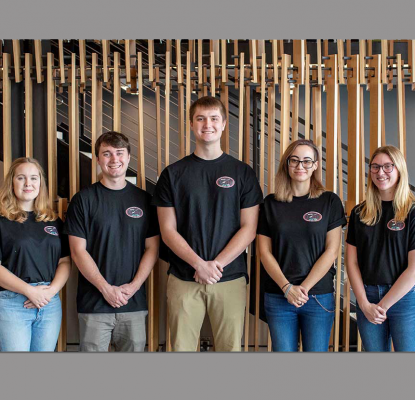Celestine Ananda, Bennett Bartel, Nicholas Bartel, Cassandra Bossong, and Taylor Peterson
Five students from Carthage College hope to improve the safety of air and space travel. Despite today’s advanced technologies, aircraft and spacecraft still do not have reliable and robust fuel gauges. The Carthage College team invented the Modal Propellant Gauging (MPG) technology to provide real-time fuel gauging for aircraft, expanding on the original method used for spacecraft developed by their faculty advisor and colleagues at NASA. MPG is a lightweight, cost-efficient, and non-invasive technology that provides accurate liquid volume measurement during dynamic events such as acceleration and changing direction, where the liquid often sloshes in the fuel tank. The team received the 2020 $10,000 “Move it!” Lemelson-MIT Student Prize for their MPG device.
Celestine Ananda is from New London, Wisconsin and is a senior at Carthage College where she majors in physics. She served as the team’s data acquisition and analysis subsystem lead, and was responsible for writing software, integrating sensors, and developing the algorithms necessary for MPG. She has leadership experience on-campus as the President of the Carthage Chapter of the Society of Physics Students, and off-campus as a Congressional Ambassador for Citizens for Space Exploration. Celestine has a passion for aerospace and hopes to continue to advance efforts toward sustained human habitation on Mars. She will be starting a PhD program in aerospace engineering at the University of Colorado Boulder in the fall of 2020.
Nicholas Bartel is another senior from New London, Wisconsin majoring in physics and taking computer science courses. He designed and implemented electrical circuits and components in the MPG payload. Nicholas mentors a youth FIRST Robotics Competition team and has led outreach efforts for multiple Carthage student organizations. Nicholas is working to develop technology that can reclaim resources from waste such as fuel and water.
Taylor Peterson is a junior from Sturtevant, Wisconsin, majoring in physics and minoring in mathematics and computer science. As the team’s system engineer, she aquired ground and inflight camera footage and acoustic data, and updated a 3D model of the payload. She has experience in mechanical engineering and data acquisition and serves as a historian for the Society of Physics Students Chapter at Carthage. Taylor intends to pursue a career in aerospace engineering so that she can contribute to NASA’s upcoming Artemis Missions to the moon and eventually Mars.
Cassandra Bossong is a junior from Trevor, Wisconsin, majoring in physics and minoring in mathematics. She was the team’s mechanical subsystem lead and integrated a new lighting system for the suborbital flight payload. Like Taylor, she is a historian for the Society of Physics Students Chapter at Carthage. She is also the operator at Carthage’s planetarium where she leads, develops, and runs shows. Cassandra is interested in project management in the aerospace industry as well as the advancement of space technology. She is developing different skills in order to follow that ambition.
Bennett Bartel is also from New London, Wisconsin, majoring in physics and chemistry, and minoring in mathematics as a sophomore. He was the power and electronics subsystem lead and worked on the MPG circuits with Nicholas. Bennett is deciding between an aviation or engineering career, but he is certain he wants his career to be centered around exploration. He hopes to be a part of future Mars explorations.
Related Articles
Milwaukee Journal Sentinel
Kenosha News


